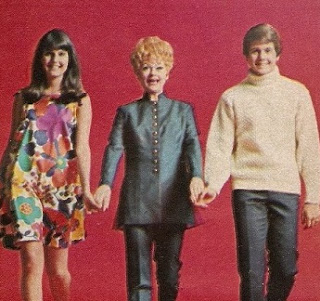The last of the trilogy of Lucille Ball tv series, Here's Lucy (1968-74), made Lucy Carter a widow with two high school-aged kids, Kim and Craig (played by her real life children,18-year old Lucie Arnaz and 15-year old Desi Arnaz Jr.). Gale Gordon reprised his blustering Mr. Mooney role, but as Harry Carter, Lucy's brother-in-law and her employer at Carter's Unique Employment Agency.
Plotlines involved the unique characters seeking employment, generation gap antics between Lucy and her kids, and the usual stream of celebrity guest stars (celebrity to the Establishment, that is): Jack Benny, Eva Gabor, Liberace, Lawrence Welk, Richard Burton, even Lucille Ball herself (when "Lucy Carter" meets the famous actress).
Notice: not a lot of teen stars.
It was definitely Lucy's vehicle; she got the best lines and all of the slapstick comedy. Craig was cute, nicely tanned, with a penchant for wearing shirts open to his navel, but he had only a few lines per episode, and in the first three seasons he had maybe three centrics (episodes devoted to him). He sang a few times, but usually when sharing a stage with his mother. After three seasons, he was written out of the series.
They weren't even trying to draw in a youth audience. Craig is a fan of Frank Sinatra, not the Beatles. In one episode, Lucy roils when Kim begins dating a boy who graduated from Berkeley -- with all the sit-ins and protests and...
As a result, Here's Lucy seems less hip, less energetic, and with fewer gay subtexts than the earlier Lucy Show.
No beefcake to speak of. No bonding. No symbolism.
But there was a LGBT-positive episode on November 6, 1972.
Phyllis Diller is scheduled to perform at a benefit, but she can't make it, so Kim finds a replacement, female impersonator Jim Bailey. Lucy is shocked at the very idea of a man impersonating a woman, but Kim and Craig are perfectly nonchalant.
I was shocked, too; at the age of 11, I had never heard of such a thing before.
In real life, Miss Ball was gay-positive. Jim Bailey was a friend of hers.




That's surprising. I guess because in the mid-90s, I think there was a very brief period where drag queens were more accepted than "straight-acting" guys.
ReplyDeleteWhen Donny Osmond was a guest star, most of the plot and scenes focused on the daughter and Donny. Lucy's uusual antics in this episode seemed noticeably minimal.
ReplyDeleteMy favorite thing about the show was the stop motion Lucy puppet during the opening credits
ReplyDelete"Here's Lucy" S2 E16 (guest star Liberace) and S2 E24 (guest star Carol Burnett) featured some non-offensive gay jokes/references. (LIBERACE: "I was the only Boy Scout with a sequined merit badge.")
ReplyDeleteMeanwhile "All in the Family" introduced words like "fag" and "queer" to the TV lexicon. Even though "All in the Family" was considered relevant and groundbreaking in its day, it seems brittle and nasty now. I say Lucille Ball's humor has aged much more gracefully.
Speaking drag queens in tv shows- you should see the Street of San Francisco episode about the the Jim Baley like star turns into a psychotic killer
ReplyDeleteThere weren't many drag queens on 1970s tv shows, but almost all were split-personality psycho-killers.
Delete